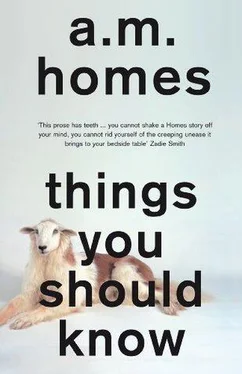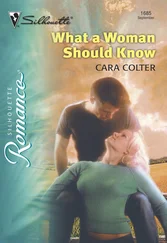She stops for lunch at the health food store. The boy behind the counter sings a song he’s just written. “I’m here now,” he says. “But it’s just temporary.” Everyone is something else, everyone wants something more.
She is back at the office. People bring her samples of materials, combinations of things. They want to know what goes with what. What brings success, power? What juxtapositions spell trouble? What do you think of titanium? Curved surfaces? How much does a building really need to breathe? They want to know how she knows what she knows. “Did you study Feng Shui?”
The temperature creeps up — the air is still, like the steady baking heat of an oven, unrelenting, broken only by the shadow of a cloud passing over.
In the afternoon, she visits her mother. The doors of the nursing home open automatically; a cool disinfectant smell pours out. Vacuum sealed, frozen in time. There is an easel by the main desk: GOOD AFTERNOON. THE YEAR IS 2002. TODAY IS WEDNESDAY, MAY 16TH. THE WEATHER OUTSIDE IS SUNNY AND BRIGHT. Her mother’s unit is behind a locked door. There is a sign on the wall: “Look as you are leaving, make sure no one follows you.”
Her mother doesn’t know her anymore. It happened over the course of a year. The first time she pretended it was a mistake — of course you know me, she said. And her mother seemed to catch herself, but then it happened again, it happened more, and then sometimes she knew her, sometimes she didn’t — and then she didn’t.
Every day, she visits. She brings her camera, she takes a picture. It is her way of dealing with the devastation, the rug pulled out from under.
“Hello,” she says, walking into the room.
“Hello,” her mother repeats, a parrot, echoing.
“How are you today?”
“How are you today?”
“I’m good,” she sits at the edge of her mother’s bed, unfastening her mother’s long braids, brushing her hair.
“Remind me,” her mother says. “Who are you?”
“I’m your daughter.”
“What makes you so sure?”
“Because I remember you,” she says.
“From before?” her mother asks.
She nods.
“My sock is itching,” her mother says, rubbing the tag around her ankle. All the residents are tagged — an alarm goes off if they wander out — the tag leg is alternated, but it remains an irritant.
“What can we do?” the nurse says. “We don’t want to lose anyone, do we?”
She rubs lotion on her mother’s leg. She puts a chestnut in her mother’s pocket just as she once saw her mother do to her grandmother — to ward off backaches. She puts an orange she picked this morning on the nightstand, resting on a bed of clover. Protection, luck, vision.
She takes her mother for a walk in the wandering garden, an inconspicuous circle, you always end where you begin — it guarantees no one gets lost.
“Let me take your picture,” she says, posing her mother by some flowering vines. “You look very pretty.”
“You look very pretty,” her mother says.
Holding hands, they walk around and around.
“I hope you remember the way home,” her mother says.
“Remember when I fell in the well? Remember when you told me how strong I was and that I had to put my mind to it?”
Her mother nods. “I used to know something,” her mother says. “Have you always had a limp?”
She visits her mother and then visits the other women up and down the hall. “Imagine us,” they say, “sitting here, like lame ducks. We see it all. There but for the grace, go I.”
When her mother is gone, she will continue to visit the unvisited. Every day she touches them; they are wrinkly, covered in barnacles and scars, filled with secret histories, things no one will know. She touches them and their stories unfold.
“You look familiar,” one of them says. “I know you from somewhere.”
“You know me from here,” she says.
“Where was I before this?” the woman asks. “Does anyone know where I am? I’m missing,” she says.
Another woman runs through the rooms, opening all the dresser drawers, searching.
“What are you looking for?” the nurse asks.
“I am looking for something,” she says in tears. “That’s what I’m looking for.”
“Describe it to me,” she says, laying her hand on the woman’s arm.
“I don’t know exactly what it is. I’m looking for something that I recognize. I think maybe I’m in the wrong place. If I could find something familiar I would know where I belong.”
She brings them pictures of themselves.
“Is this who I am?” they say.
She nods.
“Sexy, aren’t I?”
The sea. She drives to the ocean and parks. She takes a picture. She finds the fact that she is not the only one moving calming.
She is a navigator, a mover, a shifter. She has flown as a gull over the ocean, she has dived deep as a whale, she has spent an afternoon as a jellyfish floating, as an evergreen with the breeze tickling her skin, she has spent two days as water and found it difficult to recover. A seer, she is in constant motion, trying to figure out what comes next.
It is early evening. The sky is charcoal, powdery black. She is a coyote at the edge of the grass: her spine elongated, her nose pushing forward, and her skull rolling back. There is something slippery about the coyote — a million years of motion, of shifting to accommodate, keeping a fluid boundary — she is coated in a viscous watery solution.
She digs through the bushes. There is a girl in the backyard, floating alone on a raft in the water. She walks to the pool, dips her tongue into the water, and sips.
She hears the girl’s mother and father in the house. Shouting.
“What am I to you?” her mother says.
“It’s the same thing, always the same thing, blah, blah, blah,” her father says.
“Your life is a movie,” the coyote tells the girl. “It’s not entirely real.”
“Tell me about it,” the girl says.
The coyote starts to change again, to shift. Her skin goes dark, it goes tan, deep like honey and then crisper brown, as if it is burning, and then darker still, toward black. Downy feathers start to appear, and then longer feathers, like quills. Her feet turn orange, fold in, and web. A duck, a big black duck, like a dog, but a duck. The duck jumps into the pool and paddles toward the girl.
They float in silence.
Suddenly, the duck lifts her head as if alerted. She pumps her wings. Her body is changing again, she is trading her feathers for fur, a black mask appears around her eyes, her bill becomes a snout. She is standing on the flagstone by the pool, a raccoon with orange webbed feet. She waddles off into the night.
There is a tremor. The lights in the house flicker, the alarm goes off. In the pool the water shifts, a small tidal wave sweeps from one end to the other, splashing up onto the concrete.
She hurries back to the car, shifting back into herself. She rushes toward home. There is a report of the tremor on the radio news, “A little rock-and-roll action this afternoon for you folks out there,” the disc jockey says. “The freeways are stop and go, while crews are checking for damage.” She takes surface roads, afraid of the highways, the overpasses, the spaghetti after a quake.
She pulls into the driveway, the house is still standing, nothing seems terribly wrong.
Every day she carries a raw egg in her pocket, to collect the negative flow of energy — it acts like a sponge, absorbing it, pulling it away from her. At the end of the day she smashes it back to earth, the front yard is littered with white eggshells.
Her key doesn’t work, the small rumble must have caused a shifting of the tumblers, a loosening of the lock, the key goes in but won’t turn. She is knocking, she is ringing the bell, going back to the car and tooting the horn.
Читать дальше












